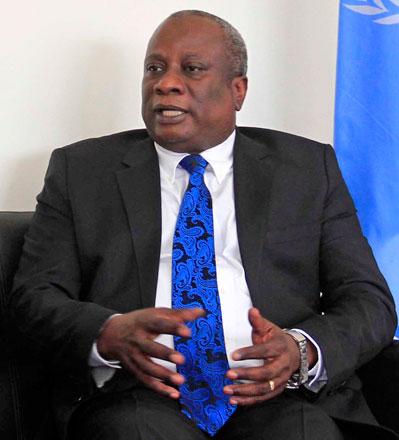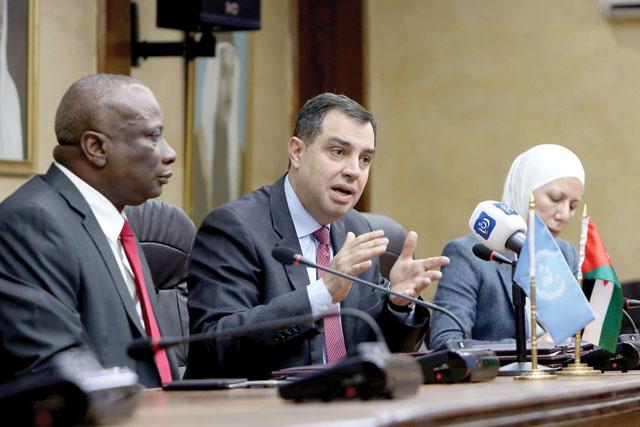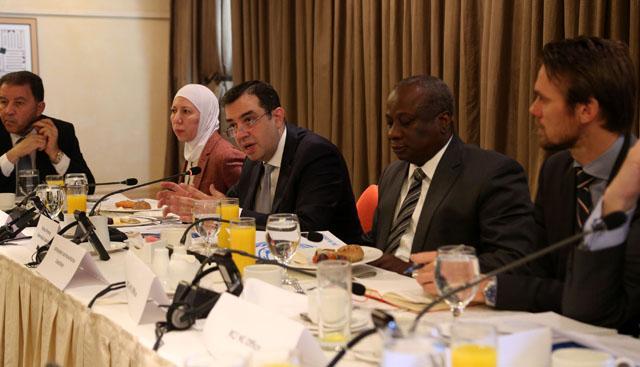You are here
‘Jordan has turned refugee challenge into opportunity’
By Khetam Malkawi - Feb 23,2016 - Last updated at Feb 23,2016

Edward Kallon (Photo by Osama Aqarbeh)
AMMAN — Jordan has been very helpful in facilitating delivery of humanitarian aid to the south of Syria, a UN official has said, as the conflict in the area across the northern border has intensified over the past three months.
United Nations Resident and Humanitarian Coordinator for Jordan Edward Kallon said that the escalation has resulted in large-scale devastation of civilian infrastructure and an unprecedented displacement of some 70,000 people.
“As we speak, there are approximately 43,000 new internally displaced persons (IDPs) in southern Syria, most of whom had been displaced two or three times,” Kallon told The Jordan Times in an interview on Tuesday.
“We work with the government of Jordan in delivering the aid and officials have been very helpful in facilitating the logistic arrangements to deliver humanitarian assistance to the south of Syria,” the UN official said, adding that humanitarian assistance is transported through the northern crossing point to areas of high need. The UN and NGO partners work with local NGOs in Syria that are distributing humanitarian assistance to the affected population, Kallon added.
“With the cessation of hostilities that was announced and is expected on the 27th [of February], I am hoping the situation will change and that international staff and national staff will be able to travel across the border into the south of Syria to monitor the delivery of humanitarian assistance and enhance accountability” in the process, Kallon explained.
However, he voiced concerns that with the current bombardment and the shelling of medical facilities in southern Syria, things might not go as smoothly as hoped.
“In order to continue responding effectively to the rapidly evolving dynamics on the ground, the UN and its partners have developed a contingency plan to scale up our humanitarian response in southern Syria,” the international official said.
Immediate plans are in place to deliver food rations for an additional 55,500 IDPs and pre-position basic household items for up to 100,000 people.
London conference
Meanwhile, the UN representative expressed optimism regarding the pledges made at London conference early this month.
“I agree that [previously] Jordan had a very bad experience with international pledges, especially with the Palestinian cause, which has not been very successful over the years,” he said. However, “I was delighted with the international response at the London conference. It was unprecedented and the largest humanitarian pledges have been made for one single humanitarian crisis”.
“I am convinced of a strong political commitment from the London conference, leading to commitment for change of transformative policy adoptions, which was unique,” he said.
The Jordan Compact, the statement Jordan issued upon the conclusion of the gathering, was “innovative, focussing on strategic partnership to a holistic approach”, according to the official, who noted that the document was meant to turn the challenge of the refugee problem into development gains that would benefit Jordanians and Syrians.
The challenge at hand, however, is to translate the pledges into facts on the ground.
“This is the challenge for the UN system and for the government of Jordan and for the multilateral development banks,” he said.
Jordan Response Plan 2016-2018
The UN official also described the Jordan Response Plan (JRP) to the Syrian crisis as a manifestation of a “bold and innovative decision” by the government to bring together humanitarian and development programming under a common nationally led resilience framework.
“The JRP has been recognised as a leading global effort in finding innovative and sustainable solutions to mitigate the impact of protracted crises,” he said.
In addition, Kallon said, the JRP outlines a coherent and sequenced response to the impact of the Syria crisis. It embodies a multi-year vision to guide short and medium-term interventions, while ensuring immediate and concrete improvements to the lives of refugees and people living in host communities.
“The introduction of a multi-year plan will allow donors to undertake multi-year budgeting and resource allocation, while facilitating greater funding predictability for operational partners,” he explained.
Receiving more refugees
Meanwhile, Kallon said the UN always encourages governments to offer asylum to people seeking safe refuges, but for Jordan, it has “reached a saturation point, given the small economic base of the country”.
Although “we keep advocating to the government of Jordan to allow in vulnerable groups that have been affected by this crisis”, he said, the UN “understands the government position, we also have to be very thankful for the hosting of 630,000 registered refugees”.
UN Development Assistance Framework (UNDAF)
In 2014, the UN decided the transition of the UNDAF into the UN Assistance Framework.
This transition, according to Kallon, was done to adopt the assistance framework to address the priorities of this country.
The impact of Syrian crisis is still very severe, the UN official said, so in the next generation of UNDAF, “we will continue to use this approach to ensure that we deal with the priorities of this government”.
The new UNDAF cycle that will start next year will include the needs of Jordan to address the impact of the Syrian crisis and also to support the government and the structural development.
The employment of Syrian refugees
The UN views Syrians’ access to the local job market as a unique economic opportunity for Jordan that needs to be supported by donors and multilateral development banks with investment on concessional terms as stated in the Jordan Compact, Kallon said.
He added that this move will transform the refugee problem into an opportunity to make development gains and attract investment for macroeconomic recovery.
“My appeal is that Jordan needs more than just resilience support and assistance; Jordan needs investments,” Kallon stressed.
Sustainable Development Goals (SDGs)
The UN is working with the Ministry of Planning to raise awareness on the 2030 SDGs that were recently endorsed by the member states and the UN country team is working with the ministry to develop a roadmap to implement the SDGs in the national planning process.
“A workshop is planned very soon to develop this roadmap, but the government of Jordan has already addressed some of the SDGs in the 2025 vision and the executive programmes that have already been developed,” said the UN resident.
“So we will build on this effort that has already been started,” he added, to lay the foundation for Jordan to start working on the SDGs and to address its structural development needs.
Related Articles
The Planning and International Cooperation Ministry and the UN on Saturday signed a launching agreement of the Jordan Resilience Fund (JRF) as a unified channel for donor contributions against the impact of the Syrian crisis on Jordan.
AMMAN — Between 2018-2020, Jordan’s needs under the Jordan Response Plan (JRP) for the Syrian Crisis are estimated at about $7.3 billio
The Syrian crisis has placed, and continues to place, an overwhelming burden on Jordan, and the Kingdom cannot meet this challenge without the strong engagement and continued generosity of partners, Planning Minister Imad Fakhoury said on Monday.


















